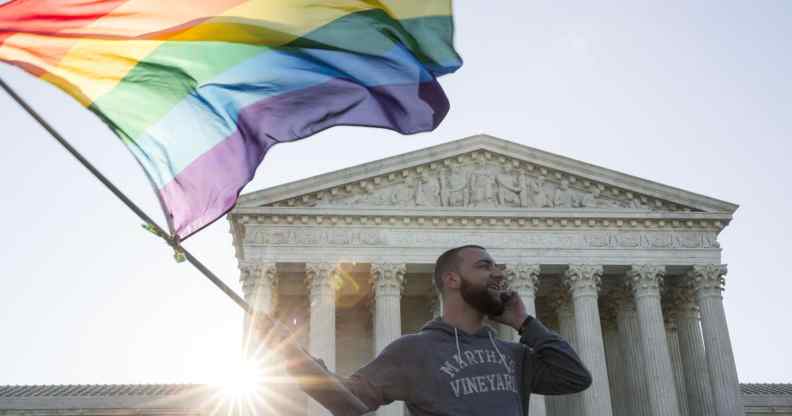Republican wants Texas to allow people to ‘respectfully’ oppose marriage equality

Marriage equality is firmly in the sights of conservative US politicians. (Drew Angerer/Getty Images)
A lawmaker has paved the way for Texas’ Attorney General to decide whether people should have the option to no longer recognise marriage equality.
Republican Representative James White sent a letter to Ken Paxton on 19 October openly challenging Obergfell v. Hodges, the long-sought landmark 2015 decision that established a nationwide right to same-sex marriage.
The representative for District 19, which encompasses Polk, Hardin, Jasper, Newton, and Tyler counties, wrote that the decision goes against state law, which “continues to define marriage exclusively as the union of one man and one woman”.
Write then quotes the state’s Family Code from the Texas Constitution, which states: “A marriage between persons of the same sex or a civil union is contrary to the public policy of this state.”
But as much as this is still on the books, with state legislators never bothering to remove it, it seems, the Supreme Court’s decision makes the law unenforceable.
Republican legislator ‘respectfully’ asks for marriage equality to be made null and void
“The State of Texas has not amended or repealed its marriage laws in response to Obergefell v. Hodges,” he wrote in the latter, “and the Supreme Court has no power to amend formally or revoke a state statute or constitutional provision.
“Even after opining that the state law violates the Supreme Court’s interpretation of the Constitution.”
White called on the Attorney General to invalidate De Leon v. Perry, a 2014 federal lawsuit that saw a judge rule that it was unconstitutional to prohibit same-sex couples from marrying in the state.
“I respectfully ask that you clarify that neither Obergefell nor De Leon requires private citizens to recognise homosexual marriages, and neither decision requires or allows them to disregard the extant law of Texas that continues to define marriage.
“Thank you for considering this request,” White concludes.
Obergfell v. Hodges, the triumphant upshot of decades of activism, was a 5-4 ruling that set off tears of joy outside the Supreme Court.
In considering marriage the “keystone of our social order”, the decision said that to deny marriage equality goes against the Equal Protection Clause of the Fourteenth Amendment, which states: “No state shall […] deny to any person within its jurisdiction the equal protection of the laws.”
“No longer may this liberty be denied,” Justice Anthony Kennedy wrote for the majority in the historic decision.
“No union is more profound than marriage, for it embodies the highest ideals of love, fidelity, devotion, sacrifice and family.
“In forming a marital union, two people become something greater than once they were.”

